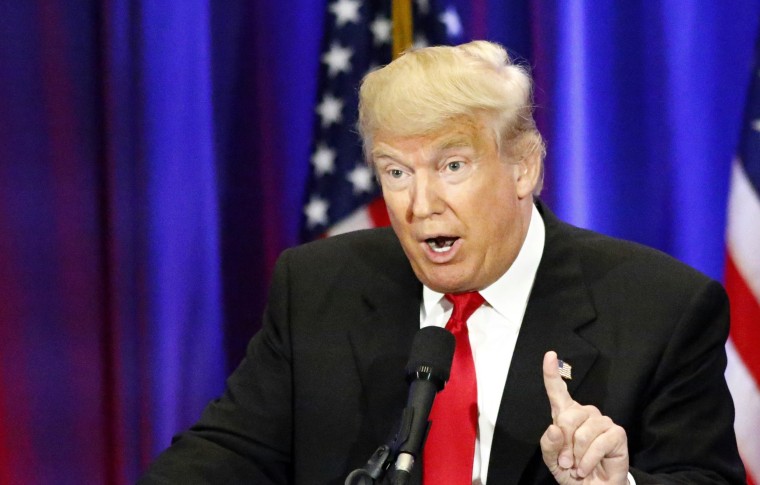A decade ago, donors didn’t pay for presidential elections. Taxpayers did.
In recent years, though, fundraising has offered campaigns more cash than the Treasury ever could from a system many believed was now defunct –- that is, until Donald Trump’s latest fundraising report showed the candidate had just $1.3 million in the bank at the start of June.
That’s hardly enough to keep the lights on during a presidential campaign. The Trump team will need to up their fundraising game quickly or go with public money and agree to keep its spending low. Will one of America’s richest men, who once vowed to personally fund his entire race, let taxpayers pick up the tab?
Related: Is What Drove 'Brexit' Also Driving Donald Trump?
Decades of presidential candidates have accepted millions from the U.S. government to pay for pricey presidential elections, avoiding time-consuming fundraising in exchange for a limit on the amount the candidate and national party can spend in total and submitting to an audit at the end of the race.
But as elections became costlier, the restrictions became prohibitive. Then-Sen. Barack Obama opted out of the system in 2008, betting correctly that he could raise far more money on his own than Sen. John McCain, who remained in the system. In 2012, both Obama and Republican nominee Mitt Romney opted out; together with the national parties, each spent more than $1 billion during the race.
While Trump has previously hinted that he considered public funding, in May he said he was leaning away from it. "I think I've ruled it out,” he told the Associated Press. "I don't like the idea of taking taxpayer money to run a campaign.”
But while the image of a billionaire accepting public funds might not play well, the act does accomplish one of Trump’s stated goals: keeping the donor class and special interests out of his campaign. Trump boasted for months that self-funding in the primary meant he wasn’t beholden to special interests.
One high-level campaign source who requested anonymity to speak freely wouldn’t rule it out -- “The Donald Trump campaign would do whatever it takes to win” -– but said the campaign was focused on building a fundraising operation for now.
If Trump were to accept public money for the general election, he could keep fundraising and spending freely until he accepts the nomination formally in Cleveland next month. At that point, the restrictions would kick in: Trump would have to stop self-funding and limit his spending to $96.14 million, while the GOP’s presidential race spending would be capped at just $23.8 million. It would also mean The Donald could avoid the extra trips, the hours and the effort spent fundraising and answering to donors.
It’s an advantage and a freedom the self-funding candidate enjoyed during the primary.
“We didn’t have to worry about Trump’s schedule, going to fundraisers in New York and L.A. All the stuff you didn’t have to do with fundraising, the phone calls,” the source said.
Related: Trump Takes a Surreal Victory Lap in Scotland
Trump also spent far less than presumptive Democratic nominee Hillary Clinton and her rival Bernie Sanders, something the Trump campaign credited to running an unusually small campaign and enjoying earned media instead of springing for pricey paid advertising.
“I can see him as the one guy who might think he can pull this off –- that $100 million might be enough,” former Federal Elections Commissioner Brad Smith told NBC News. “Because he still thinks he’s going to get all this free media.”
Trump has reveled in the constant coverage he received during the primary; donors and campaign sources say his ability to draw the media’s attention is a big asset -– one they’re betting on. An analysis by SMG Delta found that Trump had enjoyed nearly $2 billion in free advertising through February, more than double what Clinton saw and almost 10 times what establishment favorites Sen. Marco Rubio and former Florida Gov. Jeb Bush each received.
But even if Trump continues to get heavy coverage, the spending restrictions that come with public funding are significant: From the moment he accepts the nomination at the convention, Trump would have to stop self-funding (he could throw in only $50,000 of his own money) and navigate the Treasury’s $120 million cap. Meanwhile, Clinton has already raised nearly three times that figure and is expected to add and spend hundreds of millions more.
Related: Trump Threatens to Self-Fund Campaign
During the primary, Trump spent just $63 million, according to the latest FEC reports -- $43 million of his own money and another $20 million from donors -- but he insists the campaign will have no problem raising the money needed for the general, even after they ended May with a low coffer balance.
Meanwhile, Trump has made it clear he doesn’t want to foot the bill for his entire general election.
“I’ll be putting up money but won’t be completely self-funding,” Trump told the Wall Street Journal in early May, vowing to put together a “world-class” fundraising machine and saying he’d raise $1 billion for the general election.
A month later the candidate and his donors began walking back that $1 billion number.
“I just don’t think I need nearly as much money as other people need because I get so much publicity. I get so many invitations to be on television. I get so many interviews, if I want them,” Trump told Bloomberg News.
It begs the question: Could $96 million of taxpayers' money be enough?

